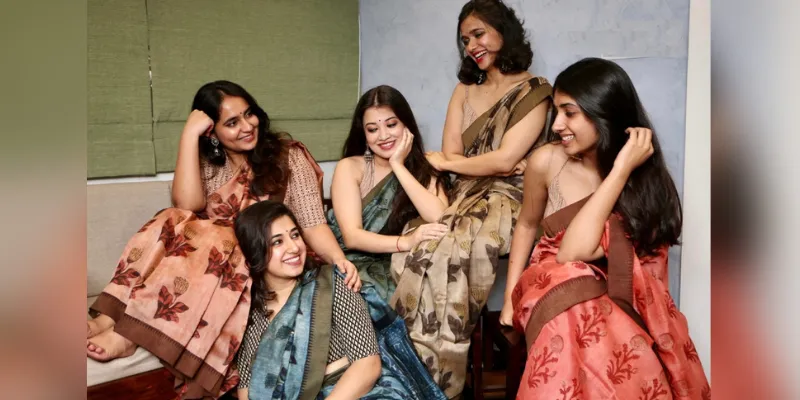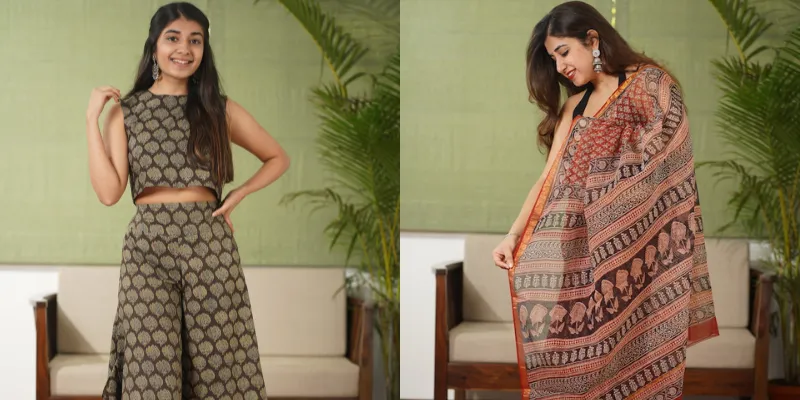How this mother-daughter duo launched an ethnic wear brand from home to touch nearly Rs 10Cr in revenue
Mumbai-based The Indian Ethnic Co now has three offices, works with 1000 artisans from across India, receives nearly 3000 orders a month, and differentiates itself through its dance marketing reels.
Mother-daughter duo Hetal (58) and Lekhinee Desai (29) visited a handloom exhibition in 2016 for a shopping spree, but instead came back with an exciting business idea and 50 metres of fabric with the ajrakh print.
They got the fabric stitched into kurtis in various sizes and designs by their neighbourhood tailor. Then, sitting in the bedroom of her Mumbai apartment, Lekhinee created a Facebook page, posted a few pictures of the completed outfits, and distributed the link amongst her circle of friends. And thus began the journey of The Indian Ethnic Co.
Started as a passion project from a family home, it now has three busy offices, ships products worldwide, and contributes to the livelihoods of nearly 1000 artisans.
And what’s more - in just four years, the clothing brand is touching nearly Rs 10 crore in turnover, and comfortably dealing with 3000 monthly orders.
The handcrafted journey
Talking to SMBStory, Lekhinee, co-founder and Marketing Head of the company, says being an ardent handloom lover, her mother did not think highly of the readymade outfits available in the market. She says as a child, her mother always bought material and stitched beautiful dresses for her sister and her.
“My mom has great design aesthetics and a natural eye for silhouettes and fabrics. So I nudged her to do something about her talent. We started with an initial investment of Rs 50,000.” says Lekhinee.

Ajrakh Dabu Hand Block Printed Chanderi Silk sarees
A day after Lekhinee distributed her Facebook page, they received their first order from Goa, and immediately after, another order came in from Kerala.
“We were awestruck by the response. Never we had imagined that within a day, we’d be able to sell our product,” Lekhinee exclaims.
Growing the business
From 2016 to 2018, the company only sold through their Facebook and Instagram pages. Lekhinee, who was pursuing her MBA at the time, says she also took on the responsibility of managing orders, shipment, and social media marketing.
Things took a turn when Lekhinee completed her MBA, and got a job offer from ITC Kolkata. At this point, she had to choose between pursuing a corporate career and continuing in the family business.
Forsaking the family business was a tough choice, but what was even tougher was leaving everything on her mother’s shoulder.
“Social media was the genesis for our brand, and I am good with that medium. However, I was not too sure my mother would be as comfortable with it, so we decided to launch our own website to streamline the process,” Lekhinee tells SMBStory.
Lekhinee took the help of Canada-based online store builder, Shopify, as onboarding a website development agency or professional was an expensive prospect. Once the website was in place, she realised digital marketing was a must to drive traffic, so Lekhinee self-taught Facebook and Google ads to run digital ads.
“All this happened between the two-three months I had before joining my new job in Kolkata. Once the website was set up, my mother learned to operate a computer, understood the workings of the internet, and mastered the website’s backend workings too.”
After the launch of the website, the journey has been upwards for The Indian Ethnic Co. Lekhinee says the company hit Rs 1 crore in revenue in the first year of launching a website in 2019, whereas it was earlier around Rs 24 lakhs per annum until 2017.
Seeing the tremendous growth of the company, Lekhinee quit her job after 11 months, and joined the business full time in late 2019.
Growing 3x during lockdown
The pandemic-induced lockdown period brought down the number of orders for the brand. And for the orders that did come in, Lekhinee says they had to set expectations right. Customers were informed that their outfits would only get delivered once logistics for retail brands opened up.
“We received around 915 orders in March 2020 but had a slump in April and May with 589 and 408 orders respectively. From the month of June, business picked up with over 1000 orders a month.”
Lekhinee claims The Indian Ethnic Co managed to grow 3x in the pandemic year, as many households took to ecommerce due to external restrictions. “Many larger brands like had halted its online operations, so we saw a growing demand. We did half the revenue of 2018-19 between April and May 2020, but geared up from June onwards.”
The company continued to operate from home until the first half of 2020. It subsequently opened three offices in Mumbai in October 2020, and also hired nearly 10 employees to manage the business operations. The duo’s neighbourhood tailor is now working full time with the company, and manages a team of designer tailors. Besides him, there are 10 other master tailors working with the company.
Supporting the artisans
After having purchased the first lot of fabrics from noted ajrakh artisan Abdul Jabbar Khatri, Hetal connected with him for a business opportunity. She networked with other artisans as well through references. Lekhinee says that they are now members of the WhatsApp group ‘The Craft Channel’, which connects business owners with artisans.
“When we founded The Indian Ethnic Co., we just had one goal - to make Indian fashion responsible, sustainable and truly handcrafted. What we mean by "truly handcrafted" is that the fabric is handwoven, the dye is handmade with organic and vegetable dyes, the print is hand block, and the final product is hand-tailored,” Lekhinee explains.

The Indian Ethnic Co's Grishma Collection and Kota Doriya in Bagru Block Print
The company deals in handcrafted fabrics like Ajrakh, Bandhani, Bagh, Batru, Balotra, Dabu, Sanganeri, and more. Besides salwars and kurtis, their products now involve saris, dupattas, western and Indian tunics, silver jewellery and more.
The brand also sources Kalamkari fabric from Nagendra Rao, a noted Kalamkari artist.
The marketing strategy
Hetal and Lekhinee want to bring timeless and ethnic Indian prints to the fore, give them a contemporary twist, and make them relatable for the everyday woman. Hence, they always showcase their products through real women and avoid exaggerated posed photographs.
Lekhinee claims the brand pioneered Dance Marketing on social media, which industry stalwarts have now started to follow. The brand also did not go the influencer marketing route. “The dance video formats have gone viral on the internet, it propelled our online sales and social media currency dramatically.”
“We also did not spend majorly on marketing or product photography. We managed shots from my IphoneX, and my sister or I modelled the outfits,” she adds.
Competition and the challenges
According to Technopak, the Indian ethnic wear market is valued at Rs 70,000 crore; and women's ethnic wear has an 85 percent (Rs 59,500 crore) share in the market. It is expected to grow at a CAGR of 10 percent till 2022.
Competing with the likes of FabIndia, , and Farida Gupta, Lekhinee says what differentiates The Indian Ethnic Co. from others is their unique marketing and relatability factor.
As for challenges, Lekhinee mentions the payment mode of ‘Cash-on-Delivery’ (COD) as being a dampener. She cites instances when buyers order for COD delivery, but return the product at the time of delivery. “This causes unnecessary two-way logistics expense for us, and being a bootstrapped business, it affects us big time.”
The way ahead
“My mom wants to create an encyclopedia of information about artisans and their craft, where information about all kinds of fabrics from various parts of our country are available in one place,” says Lekhinee.
This family-run business will also soon venture into kidswear, menswear, and home décor.
Edited by Anju Narayanan





1563874718888.png?mode=crop&crop=faces&ar=16%3A9&format=auto&w=1920&q=75)



